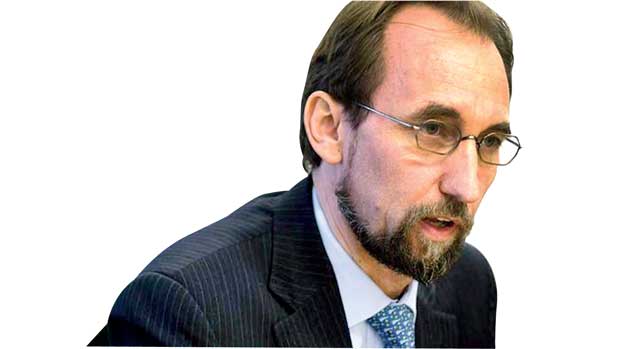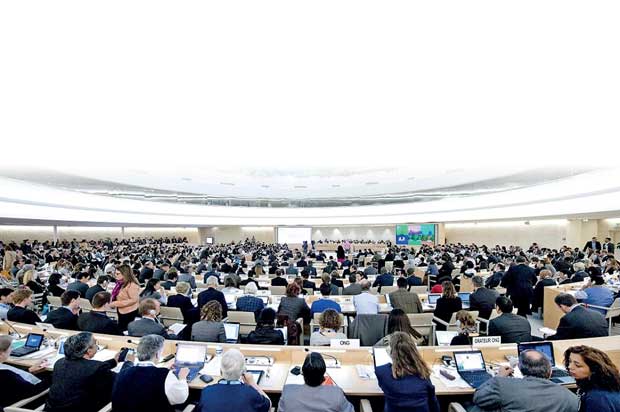Reply To:
Name - Reply Comment
Last Updated : 2024-04-24 11:56:00
Going by the recent statements made by the leaders of Sri Lanka and the United Nations Human Rights Council (UNHRC), which is stressing the need for reconciliation among various communities in Sri Lanka, it is puzzling as to how long the reconciliation between them would last.

During the last regime of President Mahinda Rajapaksa, the relationship between the two had gone so sour that many doubted whether the leaders of the then Government would be hauled before the International Criminal Court for Human Rights violations, allegedly committed during the recent ethnic war in the island.
President Rajapaksa and his loyalists had also been complaining that the heads of the UNHRC were planning to send the leaders of his regime to the electric chair.
However, with the regime change in the country in January 2015, the relationship between the two parties became  cordial as that change had the blessings of the West and the new Government headed by President Maithripala Sirisena and Prime Minister Ranil Wickremesinghe took several measures in the Human Rights and reconciliation fields, which had been stressed by the UN human rights body.
cordial as that change had the blessings of the West and the new Government headed by President Maithripala Sirisena and Prime Minister Ranil Wickremesinghe took several measures in the Human Rights and reconciliation fields, which had been stressed by the UN human rights body.
Yet, now the situation seems to have changed again for the worse.
The UNHRC which had refrained from adopting any resolution on Sri Lanka last year is said to be planning to bring in a new resolution on the country, while accusing it though in a mild tone. The report presented last month by UN Human Rights High Commissioner Prince Zeid Ra’ad Al-Hussein in the Human Rights Council has even accused the Sri Lankan Government that it did not have the political will to implement some of its commitments under the resolution adopted with the co-sponsorship of the country in 2015.
In fact, in fairness to the UNHRC, the conflict or the difference of opinion between the Maithri-Ranil government and the UN human rights body were not initiated by the latter. It was the backtracking by the Sri Lankan Government of promises and commitments, which had been agreed upon, that had resulted in the present conflict.
The commitments were not a secret as they had been documented as a resolution of the UNHRC. Nevertheless the government delays or backs down on some of its own assurances. For instance, it was the Sri Lankan Government that had agreed to put in place an accountability mechanism with the participation of foreign judges in September 2015. And now the President and the Prime Minister say that foreign participation in that mechanism was not politically viable.

This reminds us of the predicament faced by President Mahinda Rajapaksa after giving an assurance soon after the end of the war to former UN Secretary General Ban ki-moon on an accountability process for addressing violations of international humanitarian and human rights law.
The first report presented in the UNHRC by the Human Rights Chief in the wake of the present government coming to power was full of praises on the government’s initiatives towards reconciliation and accountability. However, in his last year’s report he had, in a very mild diplomatic language, cast doubts on certain actions by the government and criticized the insufficient progress in certain areas, although while showering praises for many actions that the Government had taken. This year’s report too was a manifestation of his frustration over the delay and the “lack of will” on the part of the government to fulfill certain obligations.
The frustration is evident by the repetition of views in both the reports presented last year and this year.
Last year he said “the full promise of governance reform, transitional justice and economic revival has yet to be delivered and risks stalling or dissipating. Negotiating party politics and power sharing within the coalition has proved complex as the Government seeks to build and retain the two-thirds majority in parliament necessary to reform the Constitution. This is manifest in an extensive Cabinet with overlapping ministerial mandates, and mixed messages on crucial issues such as accountability.”
And this year he states “Party politics, including the balancing of power between the different constituencies of the coalition in the run-up to constitutional reforms, have contributed to a reluctance to address difficult issues regarding accountability or to clearly articulate a unified position by all parts of government. Unclear and often contradictory messages have been delivered on transitional justice mechanisms by the President, the Prime Minister and various members of the Cabinet. … Public messaging around transitional justice and reconciliation has been generally confusing and at times contradictory.”
The UN Human Rights Chief seems to be referring clearly to the conflicting views expressed by the leaders of the Government especially on the participation of foreign judges in the special court proposed by the UNHRC in 2015 as mixed messages, confusions and contradictions.
In fact the government’s position on the matter is not clear even to the people of the country as President Maithripala Sirisena and Prime Minister Ranil Wickremesinghe were observing that the participation of the foreign judges was not politically feasible, while Foreign Affairs Minister Mangala Samaraweera was requesting more time to implement the commitments under the resolutions one of which was institution of a “hybrid court.”
The Government, as pointed out by Prince Al-Hussein has created several ad hoc bodies, including the Secretariat for Coordinating Reconciliation Mechanisms (SCRM), and the Office for National Unity and Reconciliation, and several technical working groups tasked with drafting blueprints for the accountability and reconciliation mechanisms to be established.
Clearly these measures were taken for international consumption. A Reconciliation Task Force has been established under the SCRM and the main recommendations contained in its report that was published in January included the establishment of a hybrid court with a majority of national judges and at least one international judge per bench.
However, the President publicly denounced the recommendation for a hybrid court, while the Justice Minister was lashing out at the Task Force for making such a recommendation. This again reminds us of the Mahinda Rajapaksa regime rejecting the recommendations of its own Lessons Learnt and Reconciliation Commission (LLRC).
Needless to say, that the Government has the right to reject a recommendation by the UNHRC or its head. But here the government is rejecting one of its commitments under a resolutions adopted in the world’s human rights body with its own co-sponsorship.
The Human Rights High Commissioner has referred to several famous cases which he calls as emblematic cases such as the murder of prisoners at the Welikada prison in 2012, killing of protestors by Army personnel at Rathupaswela in August 2013, killing of five students and 17 NGO workers in Trincomalee in 2006, the Kumarapuram massacre and disappearance of Journalist Prageeth Ekneligoda.
He says “The lack of decisive progress in the above-mentioned emblematic cases reflects a lack of capacity or willingness of the State to prosecute and punish perpetrators of serious offences when they are linked to security forces. This seems to be a challenge to the assurance Foreign Affairs Minister Mangala Samaraweera gave at the UNHRC in 2015 in the form of a request “don’t judge us by the broken promises, experiences and u-turns of the past.”
The Human Rights Chief further states in his report:
“The failure to show progress in the above-mentioned cases only strengthens the case for the establishment of a specialized court to deal with system crimes, staffed by specialized personnel and supported by international practitioners” This indicates that the government has been caught in a trap in respect of foreign participation due to the circumstances that had led to slow progress in these cases.

Add comment
Comments will be edited (grammar, spelling and slang) and authorized at the discretion of Daily Mirror online. The website also has the right not to publish selected comments.
Reply To:
Name - Reply Comment
US authorities are currently reviewing the manifest of every cargo aboard MV
On March 26, a couple arriving from Thailand was arrested with 88 live animal
According to villagers from Naula-Moragolla out of 105 families 80 can afford
Is the situation in Sri Lanka so grim that locals harbour hope that they coul